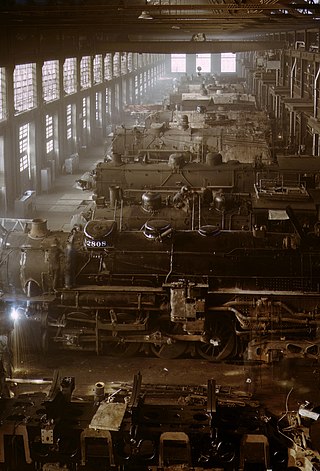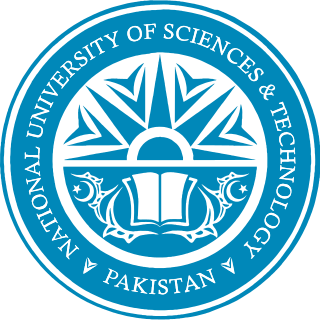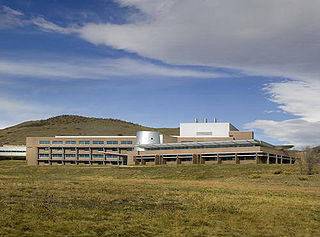
A fuel cell is an electrochemical cell that converts the chemical energy of a fuel and an oxidizing agent into electricity through a pair of redox reactions. Fuel cells are different from most batteries in requiring a continuous source of fuel and oxygen to sustain the chemical reaction, whereas in a battery the chemical energy usually comes from substances that are already present in the battery. Fuel cells can produce electricity continuously for as long as fuel and oxygen are supplied.
The Fraunhofer Society is a German research organization with 76 institutes spread throughout Germany, each focusing on different fields of applied science. With some 29,000 employees, mainly scientists and engineers, and with an annual research budget of about €2.8 billion, it is the biggest organization for applied research and development services in Europe.

In sociology, industrial society is a society driven by the use of technology and machinery to enable mass production, supporting a large population with a high capacity for division of labour. Such a structure developed in the Western world in the period of time following the Industrial Revolution, and replaced the agrarian societies of the pre-modern, pre-industrial age. Industrial societies are generally mass societies, and may be succeeded by an information society. They are often contrasted with traditional societies.

Wrocław University of Science and Technology is a technological university in Wrocław, Poland. With buildings and infrastructures dispersed throughout the city, its main facilities are gathered at a central location near Plac Grunwaldzki, alongside the Oder river. It operates three regional branches in Jelenia Góra, Legnica, and Wałbrzych. Huffington Post UK named Wrocław University of Science and Technology in the top 15 of the World’s Most Beautiful Universities Rankings.

The National University of Sciences & Technology (NUST) is a multi-campus public research university with its main campus in Islamabad, Pakistan.
Leapfrogging is a concept used in many domains of the economics and business fields, and was originally developed in the area of industrial organization and economic growth. The main idea behind the concept of leapfrogging is that small and incremental innovations lead a dominant firm to stay ahead. However, sometimes, radical innovations will permit new firms to leapfrog the ancient and dominant firm. The phenomenon can occur to firms but also to leadership of countries or cities, where a developing country can skip stages of the path taken by industrial nations, enabling them to catch up sooner, particularly in terms of economic growth.

The National Energy Technology Laboratory (NETL) is a U.S national laboratory under the Department of Energy Office of Fossil Energy. NETL focuses on applied research for the clean production and use of domestic energy resources. It performs research and development on the supply, efficiency, and environmental constraints of producing and using fossil energy resources while maintaining affordability.

The National Renewable Energy Laboratory (NREL) in the US specializes in the research and development of renewable energy, energy efficiency, energy systems integration, and sustainable transportation. NREL is a federally funded research and development center sponsored by the Department of Energy and operated by the Alliance for Sustainable Energy, a joint venture between MRIGlobal and Battelle. Located in Golden, Colorado, NREL is home to the National Center for Photovoltaics, the National Bioenergy Center, and the National Wind Technology Center.
Doosan Group is a South Korean multinational conglomerate corporation. In 2009, the corporation was placed in the Fortune Global 500 index. It is the parent company of Bobcat and Škoda Power. Doosan Group is the oldest running company in South Korea and is ranked as one of the world's top 10 largest heavy equipment manufacturers in 2018.

Taiwan relies on imports for almost 98% of its energy in 2016, which leaves the island's energy supply vulnerable to external disruption. In order to reduce this dependence, the Ministry of Economic Affairs' Bureau of Energy has been actively promoting energy research at several universities since the 1990s.

The Government Engineering College, Idukki (GECI) is located in the town of Painavu, in Idukki district of the Indian state of Kerala. It is affiliated to the APJ Abdul Kalam Technological University, and is approved by the All India Council for Technical Education (AICTE), New Delhi.
Jeonbuk National University is one of ten Flagship Korean National Universities founded in 1947, located in Jeonju, South Korea. Jeonbuk National University has been ranked 551–560th in the world by QS Top Universities Ranking in 2023.

The Digital Revolution, also known as the Third Industrial Revolution, is the shift from mechanical and analogue electronic technologies from the Industrial Revolution towards digital electronics which began in the latter half of the 20th century, with the adoption and proliferation of digital computers and digital record-keeping, that continues to the present day. Implicitly, the term also refers to the sweeping changes brought about by digital computing and communication technologies during this period. From analogies to the Agricultural Revolution (Neolithic) and the First Industrial Revolution (1760-1840), the Digital Revolution marked the beginning of the Information Age.
The Energy Biosciences Institute (EBI) is an organization dedicated to developing new sources of energy and reducing the impact of energy consumption. It was created in 2007 to apply advanced knowledge of biology to the challenges of responsible, sustainable energy production and use. Its main goal is to develop next-generation biofuels—that is, biofuels that are made from the non-edible parts of plants and reduce greenhouse gas emissions.
The Office of Energy Efficiency and Renewable Energy (EERE) is an office within the United States Department of Energy. Formed from other energy agencies after the 1973 energy crisis, EERE is led by the Assistant Secretary of Energy Efficiency and Renewable Energy, who is appointed by the president of the United States and confirmed by the U.S. Senate. Alejandro Moreno currently leads the office as the Acting Assistant Secretary.
The Electrochemical Society is a learned society based in the United States that supports scientific inquiry in the field of electrochemistry and solid-state science and related technology. The Society membership comprises more than 8,000 scientists and engineers in over 85 countries at all degree levels and in all fields of electrochemistry, solid state science and related technologies. Additional support is provided by institutional members including corporations and laboratories.

The Imam Hossein Comprehensive University is a public university located in Tehran, Iran.
Doosan Corporation is a corporate holding company headquartered in Euljiro 6-ga, Jung-gu, Seoul, South Korea.
Electrochemical engineering is the branch of chemical engineering dealing with the technological applications of electrochemical phenomena, such as electrosynthesis of chemicals, electrowinning and refining of metals, flow batteries and fuel cells, surface modification by electrodeposition, electrochemical separations and corrosion.

The principle of a fuel cell was discovered by Christian Friedrich Schönbein in 1838, and the first fuel cell was constructed by Sir William Robert Grove in 1839. The fuel cells made at this time were most similar to today's phosphoric acid fuel cells. Most hydrogen fuel cells today are of the proton exchange membrane (PEM) type. A PEM converts the chemical energy released during the electrochemical reaction of hydrogen and oxygen into electrical energy. The Hydrogen Research, Development, and Demonstration Act of 1990 and Energy Policy Act of 1992 were the first national legislative articles that called for large-scale hydrogen demonstration, development, and research programs. A five-year program was conducted that investigated the production of hydrogen from renewable energy sources and the feasibility of existing natural gas pipelines to carry hydrogen. It also called for the research into hydrogen storage systems for electric vehicles and the development of fuel cells suitable to power an electric motor vehicle.










